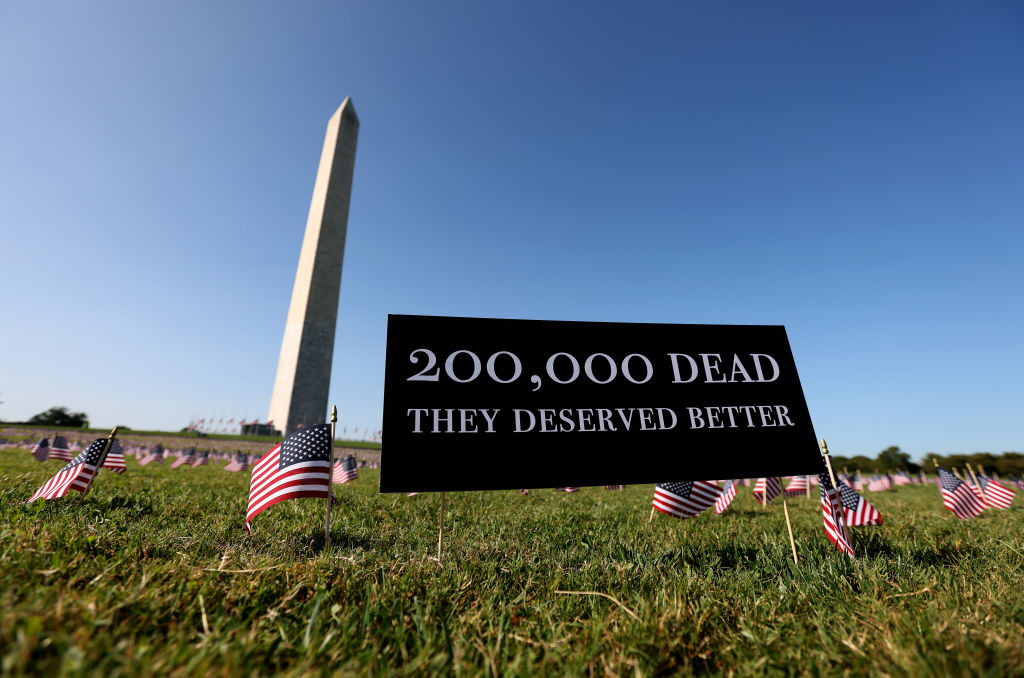The U.S. COVID-19 toll equals a death every 1.5 minutes, 8 plane crashes a day, or 67 9/11 attacks


A free daily email with the biggest news stories of the day – and the best features from TheWeek.com
You are now subscribed
Your newsletter sign-up was successful
After the U.S. hit 200,000 recorded COVID-19 deaths on Tuesday, Democratic presidential nominee Joe Biden called it "a staggering number that’s hard to wrap your head around," adding that "behind every COVID-19 death is a family and community that will never again be the same. There's a devastating human toll to this pandemic — and we can't forget that."
But "our biology is working against us" when it comes to computing this new grim death toll, Sarah Elizabeth Richards reports at National Geographic. "Researchers say our brains aren't wired to make sense of big numbers."
Maybe it helps to break it down into smaller pieces. "The number of dead is equivalent to a 9/11 attack every day for 67 days," The Associated Press notes. "It is roughly equal to the population of Salt Lake City or Huntsville, Alabama," being wiped out in seven months. "The tally means a U.S. death has happened every 1.5 minutes, on average, since the first official fatality in late February," Richards adds. "It means we have lost 1,450 plane loads full of people."
The Week
Escape your echo chamber. Get the facts behind the news, plus analysis from multiple perspectives.

Sign up for The Week's Free Newsletters
From our morning news briefing to a weekly Good News Newsletter, get the best of The Week delivered directly to your inbox.
From our morning news briefing to a weekly Good News Newsletter, get the best of The Week delivered directly to your inbox.
"If you think about it like that, assuming there are 138 seats in a classic 737, that would mean eight planes have crashed on U.S. soil every day," David Kessler, a Los Angeles-based grief specialist, tells National Geographic. "Can you even imagine that?"
Lots of people are finding it hard. That's partly because of everything else that's going on: Massive wildfires, hurricanes, civil unrest, a divisive election, and coping with life in a pandemic. "If you're already stressed out, the 200,000 statistic becomes just another thing," Princeton cognitive psychologist Elke Weber tells National Geographic. "If you think about people living in a war zone, the kind of thing that was once appalling becomes normal. Our brain neurons fire when something changes, but they stop after a while. If you're in a room with a bad smell, you eventually stop noticing it."
People can also become less compassionate as an amorphous tragedy grows too big to be personal, adds Paul Slovic, a psychologist at the University of Oregon. "Our feelings are very strong for one person in danger, but they don't scale up very well." To keep from getting numb, try to focus on the loss of individual people, not the politics or the fight over face masks, Kessler advises. "We're not talking about Juan's mother or Susan's brother." Read more at National Geographic.
Editor's note: A previous headline of this article misstated the number of COVID-19 deaths per minute. It has been corrected. We regret the error.
A free daily email with the biggest news stories of the day – and the best features from TheWeek.com
Peter has worked as a news and culture writer and editor at The Week since the site's launch in 2008. He covers politics, world affairs, religion and cultural currents. His journalism career began as a copy editor at a financial newswire and has included editorial positions at The New York Times Magazine, Facts on File, and Oregon State University.
-
 The UK expands its Hong Kong visa scheme
The UK expands its Hong Kong visa schemeThe Explainer Around 26,000 additional arrivals expected in the UK as government widens eligibility in response to crackdown on rights in former colony
-
 One great cookbook: Joshua McFadden’s ‘Six Seasons of Pasta’
One great cookbook: Joshua McFadden’s ‘Six Seasons of Pasta’the week recommends The pasta you know and love. But ever so much better.
-
 Scientists are worried about amoebas
Scientists are worried about amoebasUnder the radar Small and very mighty
-
 Trump HHS slashes advised child vaccinations
Trump HHS slashes advised child vaccinationsSpeed Read In a widely condemned move, the CDC will now recommend that children get vaccinated against 11 communicable diseases, not 17
-
 FDA OKs generic abortion pill, riling the right
FDA OKs generic abortion pill, riling the rightSpeed Read The drug in question is a generic version of mifepristone, used to carry out two-thirds of US abortions
-
 RFK Jr. vaccine panel advises restricting MMRV shot
RFK Jr. vaccine panel advises restricting MMRV shotSpeed Read The committee voted to restrict access to a childhood vaccine against chickenpox
-
 Texas declares end to measles outbreak
Texas declares end to measles outbreakSpeed Read The vaccine-preventable disease is still spreading in neighboring states, Mexico and Canada
-
 RFK Jr. shuts down mRNA vaccine funding at agency
RFK Jr. shuts down mRNA vaccine funding at agencySpeed Read The decision canceled or modified 22 projects, primarily for work on vaccines and therapeutics for respiratory viruses
-
 Measles cases surge to 33-year high
Measles cases surge to 33-year highSpeed Read The infection was declared eliminated from the US in 2000 but has seen a resurgence amid vaccine hesitancy
-
 Kennedy's vaccine panel signals skepticism, change
Kennedy's vaccine panel signals skepticism, changeSpeed Read RFK Jr.'s new vaccine advisory board intends to make changes to the decades-old US immunization system
-
 Kennedy ousts entire CDC vaccine advisory panel
Kennedy ousts entire CDC vaccine advisory panelspeed read Health Secretary RFK Jr. is a longtime anti-vaccine activist who has criticized the panel of experts
